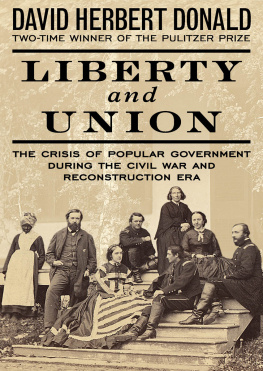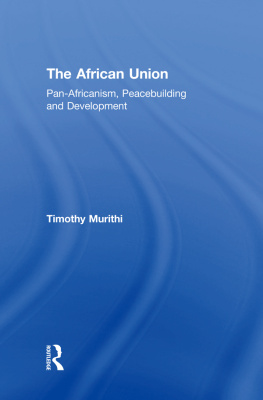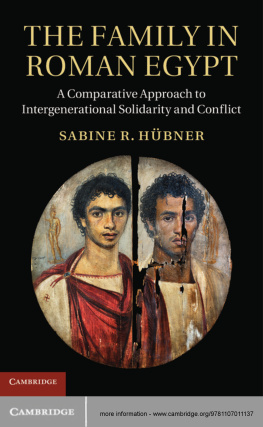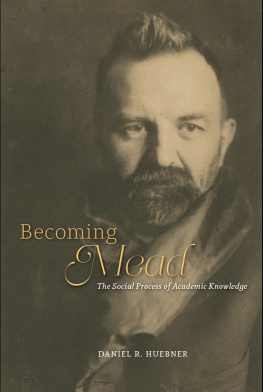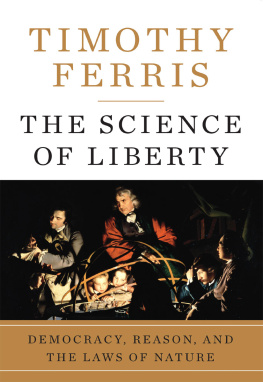LIBERTY AND UNION
THE CIVIL WAR ERA
AND AMERICAN
CONSTITUTIONALISM
TIMOTHY S. HUEBNER
UNIVERSITY PRESS OF KANSAS
2016 by the University Press of Kansas
All rights reserved
Published by the University Press of Kansas (Lawrence, Kansas 66045), which was organized by the Kansas Board of Regents and is operated and funded by Emporia State University, Fort Hays State University, Kansas State University, Pittsburg State University, the University of Kansas, and Wichita State University
Library of Congress Cataloging-in-Publication Data
Names: Huebner, Timothy S., 1966 author.
Title: Liberty and union : the Civil War era and American constitutionalism / Timothy S. Huebner.
Description: Lawrence, Kansas : University Press of Kansas, 2016. | Includes bibliographical references and index.
Identifiers: LCCN 2016004959 |
ISBN 9780700622696 (hardback) |
ISBN 9780700622702 (ebook)
Subjects: LCSH: Constitutional historyUnited States. | United StatesPolitics and government18611865. | BISAC: HISTORY / United States / Civil War
Period (18501877). | LAW / Constitutional. | SOCIAL SCIENCE / Ethnic Studies / African American Studies.
Classification: LCC KF4541 .H84 2016 | DDC 342.7302/9dc23
LC record available at http://lccn.loc.gov/2016004959.
British Library Cataloguing in Publication Data is available.
Printed in the United States of America
10 9 8 7 6 5 4 3 2 1
The paper used in this publication is recycled and contains 30 percent postconsumer waste. It is acid free and meets the minimum requirements of the American National Standard for Permanence of Paper for Printed Library Materials Z39.48-1992.
To Mom and Dad
I know of no soil better adapted to the growth of reform than American soil. I know of no country where the conditions for affecting great changes in the settled order of things, for the development of right ideas of liberty and humanity, are more favorable than here in these United States. The very groundwork of this government is a good repository of Christian civilization. The Constitution, as well as the Declaration of Independence, and the sentiments of the founders of the Republic give us a platform broad enough, and strong enough, to support the most comprehensive plans for the freedom and elevation of all the people of this country, without regard to color, class, or clime.
Frederick Douglass, 1857
PREFACE
This book is about the relationship between the Civil War generation and the founding generation. That is, it examines how Americans of the mid-nineteenth century understood the founders handiwork, the Declaration of Independence of 1776, and the Constitution of 1787. When the last of the living signers of the Constitution, James Madison, passed away in 1836, Abraham Lincoln, Jefferson Davis, and their contemporaries were well into their adult lives, and their generation possessed a keen sense of the legacy they had inherited. Whether political leaders or plain folk, Northerners or Southerners, black or white, most free Americans of the mid-nineteenth century believed in the efficacy of the American heritage of liberty and constitutional government, and this belief consistently animated the nations political debates. Social, economic, and cultural factors also shaped political development, and although the interests of the South and North diverged, a common commitment to constitutionalism remained.
War unleashed revolutionary changeschanges that were inspired, defined, and limited by Americans understanding of their founding texts. To some, the Declaration of Independence and its promise that all men are created equal represented the guiding principle of American political development, while for others, the Constitutionwith its sharp demarcation of national and state authorityrepresented the ultimate expression of republican government. As Americans debated and fought over the meaning of these two great documents and how they related to one another, the war ultimately produced two significant outcomes: slavery ended and secession failed. In the years after the war, some hoped to bring about even more far-reaching changessuch as granting to African Americans all of the same rights as whites or establishing the unquestioned supremacy of the national government. But Americans commitment to the preservation of state power and persistent strains of white supremacy acted as countervailing forces, which ultimately contained and controlled the scope of change. Most Americansmore precisely, most white Americanscame to believe that the end of slavery and the defeat of secession were revolutionary enough. Given that slavery had existed in North America for nearly two and a half centuries and that the shadow of secession had long loomed over the nations political landscape, these were surely revolutionary developments. However incomplete these changes might appear from an early twenty-first-century vantage point, for those who lived through these momentous events, the question during and after the war was never whether a revolution was occurring. Rather, it was always how far that revolution would go.
A narrative history of the era of the American Civil War, this study flows into and out of three historiographical streams: Civil War history, US constitutional history, and African American history. Over the past several decades, historical writing on the Civil War has taken a number of turns. At one time, historians and popular writers conceived of the war almost entirely as a military and political conflict, as a brothers wara white mans warlargely devoid of ideological content but rich in examples of honor and heroism. During the past three or four decades, though, professional historians, in addition to adding new layers to our understanding of military events and political debates, have investigated the social and cultural history of the conflictthe lives of common soldiers, the influence of guerilla warfare, the effects of the war on women and gender relations. If the notion of heroism once lay behind most interpretations of the war, a disillusionment fed by American involvement in Vietnam and other post-Vietnam entanglements underlay many of these new interpretations. Emphasizing the horrors of violence, death, and social destruction, recent studies have served as a sobering corrective to earlier writing. Some historians, however, have taken this antiwar theme too far, describing the Civil War as Americas greatest failure and lamenting that it watered the seeds of an American-led Christian imperialism. Despite whatever contemporary unease we may feel about the blending of patriotism, religion, and violence, the fact remains the hard hand of war merged with nationalistic and Christian impulses to bring about the abolition of slaverythe greatest reform in American history and one of the central events in the history of the Western world. Rather than viewing the conflict through the lens of contemporary disenchantment, this book aims to understand the war on its own terms, in the context of its own time. The book does not intend to glorify war, but it does attempt to tell a more authentic story, one that acknowledges that, given the economic interests and ideological commitments of white Southerners, only war could have brought about American emancipation. It thus portrays the human cost in a realistic manner while also recapturing some of the heroic character of the conflict.




